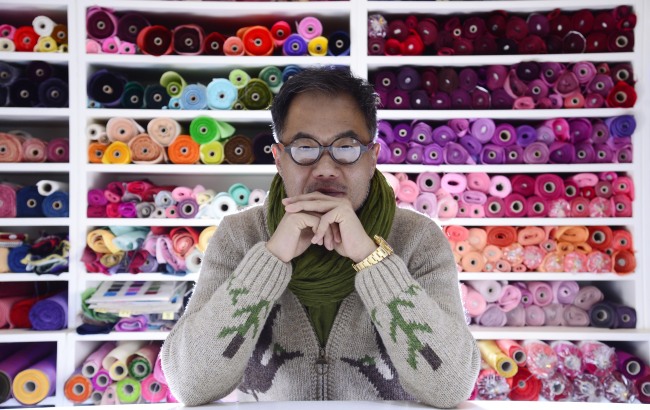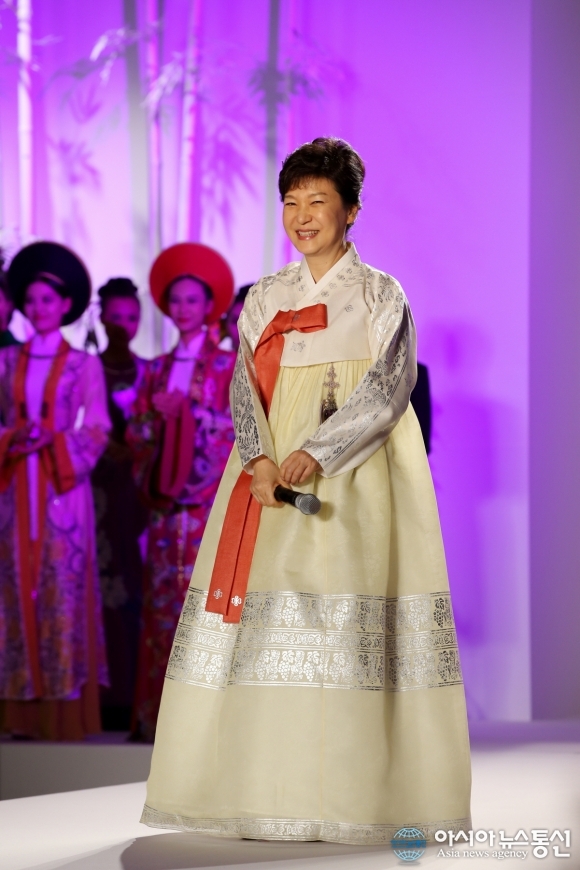 |
Hanbok designer Kim Young Seok poses for a photo at his hanbok shop at Shilla Hotel Seoul during an interview with The Korea Herald last week. (Park Hae-mook/The Korea Herald) |
Hanbok designer Kim Young Seok has developed an emotional attachment to discarded old objects in his childhood home. In elementary school, he started taking out dust-covered household objects from storage and has picked up things on his trips to the provinces since he was in elementary school.
“How many are there in my collection? I don’t know. I never tried to count. I know I have some 1,000 pillows,” said Kim in an interview with The Korea Herald at his hanbok shop in Seoul last week. “I have an obsession with objects, especially old stuff. If it looked old, I would even take a piece of rock home.”
His collection consists of folkcraft and artifacts, which have been featured in local and international exhibitions that aim to shed light on Korean traditional aesthetics and beauty. In October, his pillow collection along with other home items and accessories for women were on display at an exhibition in Ulsan. From Sunday to Dec. 24, his collection of items from Korean women’s boudoir culture will go on exhibit at the Saudi National Museum.
“I think I feel the warmth an object holds more than other people do. These are the items that were once in possession of someone and were used with care,” said Kim.
Started as a hobby, collecting objects brought a major career change for Kim.
Kim took a sewing class to learn how to repair damaged artifacts. What began as a weekly one-hour class extended to a couple of more hours to the point where he felt he could do it for a living.
“There’s a saying that if you do something for more than three days a week, it becomes your regular job, and that’s what happened to me,” Kim said, who was then working as an event planner.
His office soon turned into a work studio for making the Korean traditional hanbok. In 1999, in his mid-30s, he opened the first hanbok shop in Samcheong-dong.
His small hanbok shop then moved to an upscale underground shopping arcade at Shilla Seoul. Now 50, Kim is known for having some of the most high-profile customers in Korea, including President Park Geun-hye, former first lady Kim Youn-ok, and Hong Ra-hee, wife of Samsung Group chairman Lee Kun-hee, among others. Hillary Clinton visited the shop during her official visit to Seoul several years ago.
 |
President Park Geun-hye is one of the high-profile customers of hanbok designer Kim Young Seok. (Yonhap News) |
Kim’s hanbok received wide attention when President Park appeared in a red durumagi, a top coat worn over hanbok, on her inauguration day. Since then, he has been designing the president’s hanbok for her overseas visits to the U.S., Southeast Asia and the U.K.
“It’s been hard because there are many factors to consider in designing hanbok for the president. I have to consider appropriate color for each country and occasion because there are certain colors not favored by some countries,” said Kim.
Reviews of the President’s hanbok style have been mixed, but mostly people see it as a good opportunity to promote Korean beauty abroad.
“What I care about the most is whether she was comfortable in the dress. I don’t really pay attention to what other people say about my hanbok,” said Kim. “I ask her whether she was comfortable and if she says yes, I feel relieved, and on top of that, if other people even say it was beautiful, it couldn’t be better.”
Kim explained the next factor he keeps in mind in designing hanbok for Park is the harmony it will create with the occasion and other guests.
“Hanbok is not worn in a Korean setting anymore. The places the president goes to in hanbok are in a Western setting. Hanbok should blend well with the setting and other people,” Kim noted.
Kim’s hanbok design has been described as using a variety of colors that traditional hanbok don’t normally employ and delicate or bold patterns that are embroidered or printed on a full skirt or hanbok top.
Kim said he aims to follow the heritage of traditional hanbok design, as shown in his brand name “Traditional Hanbok Kim Young Seok.”
“What I know about the traditional styles of hanbok is just one-tenth of the whole hanbok style,” said Kim. “My design is based on the traditional hanbok style. But where I’ve been trying to make a change to the traditional boundaries is the color,” Kim noted.
Kim has been using bold colors such as orange, olive green, bright yellow, blue and pink. “No other hanbok shops have as many colors as we have,” Kim added.
Drawing on inspiration from his collection of artifacts and folkcraft, Kim has been creating his own patterns for his hanbok. Some of the well-known patterns are the apricot flower pattern on Park’s durumagi worn on her inauguration day and the flower embroidery on the skirt worn at the banquet with Queen Elizabeth II earlier this month during her state visit to the U.K. Accessories made to match the hanbok are also designed based on the women’s accessories in Kim’s life-long collection.
Although Kim is widely known as the favorite designer of high-society women, he hopes more people will wear his hanbok. His hanbok costs on average 1.3 million won ($1,200); hanbok by some well-known designers in the affluent Gangnam area go for more than 2 million won.
Another plan is to build a museum for his collection.
“It took many years to build my collection and it is part of who I am. I can’t be parted from it because my design inspiration and sources come from it,” said Kim.
By Lee Woo-young (
wylee@heraldcorp.com)









